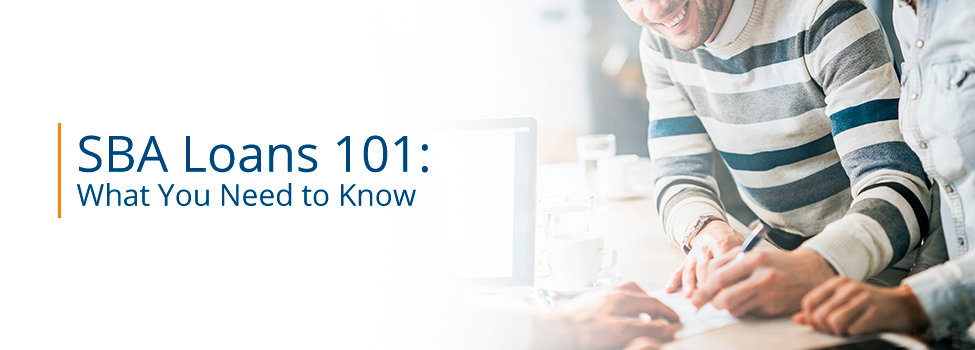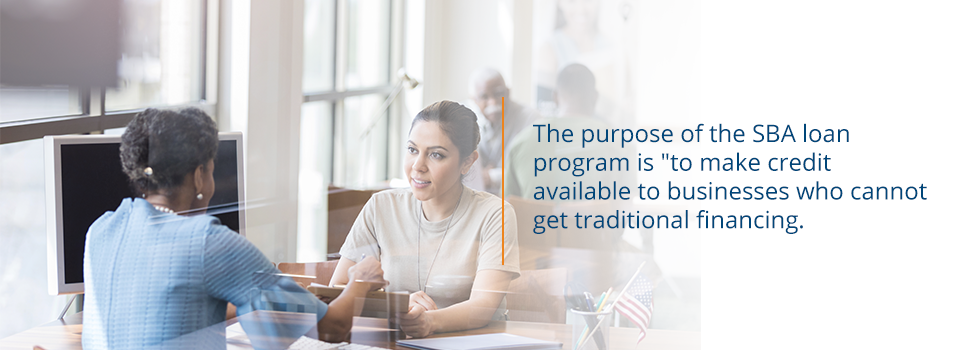SBA Loans 101: What You Need to Know

Your dream of starting a business is about to come true. Or, you hope to grow an existing company, taking it to the next level. The one thing that stands in your way is money. You need funding to launch your business or to grow it, and traditional business loans can be challenging for new or small businesses to obtain. Lenders often expect companies to have a certain amount of assets or credit history before they will approve a business loan.
Enter the U.S. Small Business Administration (SBA). The SBA is an agency of the government that helps to support small businesses and entrepreneurs. One of the agency’s most popular programs is the SBA loan program. Learn more about what an SBA loan is, what your options are and whether it’s the right choice for your small business.
What Are SBA Loans?

As Natalie Falatek, Mid Penn Bank First Vice President & Director of SBA/Guaranteed Lending, describes it, the purpose of the SBA loan program is “to make credit available to businesses who cannot get traditional financing. By creating more funding opportunities, the SBA helps to start up new business, grow existing businesses, and keep jobs in our communities.” SBA loans are either term notes or lines of credit, meaning you can receive the funds all at once and pay them back on a set schedule or receive funding on a revolving basis.
The loans themselves don’t come from the SBA. Instead, they are issued by banks and guaranteed by the SBA. If the business that takes out the loan defaults or isn’t able to pay it back, the SBA guarantees up to 85% of the value of the principal.
SBA loans are designed for specific types of businesses. To be eligible for an SBA loan, a company needs to meet the following SBA loan requirements:
- It needs to operate and be physically located in the U.S.
- It needs to be a for-profit business.
- It needs to have invested equity from the owner.
- It can’t get loans from another lender or loan program.
- It needs to be able to repay the loan.
There are also size requirements a company needs to meet to qualify for an SBA loan. Size standards vary based on industry. The standards can be either in the form of average annual receipts or the number of employees. The SBA has a size standards calculator companies can use to determine whether or not they meet the size requirements based on their industry.
Uses of SBA loans range from buying property to rebuilding a business after a natural disaster. Companies can apply for an SBA loan when they are just starting out or after years of being in business. Although a business does need to demonstrate the ability to pay back the loan, SBA loans are available for companies with weak credit.
What Are Different Types of SBA Loans?
Multiple types of SBA loans are available for startups and existing businesses. The type of loan your company applies for depends on what it plans on using the funding for, the repayment period for the loan and your funding needs. SBA loan types include:
7(a) Loan Program
The 7(a) loan program is the “flagship” SBA loan program. The maximum amount of a 7(a) loan is $5 million. The agency will guarantee up to 85% of the loan’s amount for loans up to $150,000. For loans over $150,000, the SBA will guarantee 75% of the principal’s value. There are several categories of 7(a) loans, including:
- CAPLines: CAPLines are lines of credit guaranteed by the SBA. Four distinct CAPLine programs exist: Seasonal, Builders, Working Capital and Contract. The maximum maturity for a CAPLine is 10 years. The line of credit might be revolving or non-revolving based on the type of program.
- SBA Express: An SBA Express loan is smaller than a standard 7(a), with a maximum amount of $350,000. Up to 50% of the principal is guaranteed by the SBA. The perk of the express loan program is that it offers an accelerated turnaround time from the SBA. The agency reviews express loan applications within 36 hours.
- 7(a) Small Loan: Like the SBA Express loan, the 7(a) Small Loan has a smaller maximum amount, $350,000. The SBA guarantees up to 85% of the loan’s value.
What can you use an SBA 7(a) loan for? A lot of things. Some businesses apply for a 7(a) to get funding at startup. Others use the loan to purchase equipment or property or for working capital.
504 Loans
The 504 loan program has some things in common with the 7(a) program but also notable differences. Like 7(a) loans, 504 loans offer interest rates that are below the cap set by the SBA. The maximum amount of a 504 loan is typically $5 million, but some manufacturing or energy-efficient projects can borrow up to $5.5 million.
One difference between a 504 loan and a 7(a) loan is how a business can use the funding. SBA 504 loans are meant to be used to purchase equipment or real estate. The loans also consist of three parts: funding from the business owner, funding from a Certified Development Company (CDC) and funding from a lender, such as a bank. The business owner needs to put down 10%, while the CDC contributes 40%, and the lender contributes 50%.
The term of a 504 loan ranges from 10 to 25 years.
Disaster Loans
SBA Disaster loans are different from other types of SBA loans. The loans come directly from the SBA, rather than being guaranteed by the SBA and offered through a bank. To qualify for a disaster loan, a business needs to be in a declared disaster area. The loans are available to businesses of all sizes and to non-profit and for-profit companies. Another difference between SBA disaster loans and other SBA loans is the maximum amount of the loan. A business can borrow up to $2 million to pay for losses that aren’t covered by insurance.
Microloans
The maximum amount of an SBA Microloan is considerably lower than the maximum amount of other SBA loan programs: $50,000. The maximum term of the loan is also much shorter, at just six years. Microloans are typically designed to help small businesses get started, but can also be used to purchase inventory, equipment and furniture or for working capital.
SBA Microloans are available from nonprofit community-based organizations, who act as intermediary lenders, distributing the funds from the SBA. Often, the lenders require a business owner to put up some sort of collateral to qualify for the loan.
What Are Some Benefits of SBA Loans Over Other Loans for Small Businesses?

The goal of the SBA loan program is to help make it easier for small businesses to get loans. It reduces the risk to lenders since it guarantees a significant portion of the loan amount. Thanks to the SBA loan program, small businesses have the option of getting lending terms or credit that would not otherwise be available to them. In addition to providing financing to companies that would otherwise not be able to qualify for it, some of the benefits of SBA loans vs. commercial loans include:
- Longer payment terms: Most commercial loans have repayment terms under 10 years. That’s not the case with SBA loans. The repayment terms depend on the program but often range from 10 to 25 years.
- Creative repayment structures: SBA loan programs occasionally offer more flexible or creative repayment structures compared to traditional business loans. Interest-only payments are available on 7(a) loans. CAPLines also offer a variety of repayment structures.
- Covers expenses not covered by traditional bank financing: What a company can use a traditional business loan for is usually very limited. In comparison, SBA loans can be used for more expenses and costs. An SBA loan might be used to cover intangible assets, including goodwill, or an additional purchase price of a business that includes properties such as intellectual property and patents.
- Provides financing to businesses in recovery: A business with poor credit might find it challenging to obtain traditional bank financing. Although a company needs to demonstrate the ability to repay an SBA loan, businesses with bad credit do often get approved for loans. If your business has experienced financial and credit-related setbacks and is currently in recovery and trying to bounce back, an SBA loan can help.
- Lower interest rates: The interest rates offered on SBA loans are typically lower than the rates available on other types of business loans. Interest on 7(a) loans is set by adding the base rate to the maximum allowable spread. For loans up to seven years, the maximum spread is 2.25%. For loans with terms of more than seven years, the maximum allowable spread is 2.75%.
- Lower fees: SBA 7(a) loan fees are based on the amount guaranteed and the maturity date. The fee for a loan with a guarantee under $150,000 is zero while the fee for a loan with a guarantee over $150,000 and a maturity date under one year is 0.25%. The fee for a $150,000 or higher guarantee and a maturity date over one year is 3.00%.
Collateral Needed for SBA Loans
For the most part, a business needs to put up some sort of collateral to obtain an SBA loan. Collateral, such as a business’s property or a business owner’s home, serves as a form of guarantee on the loan or another way to repay the loan if a borrower defaults. While collateral is typically required, there are some exceptions.
If the only issue a borrower’s application has is a limited amount or insufficient amount of collateral, the SBA won’t necessarily decline the application. To qualify for the exception, a business needs to present all available collateral, even if it’s not enough to cover the amount of the loan.
SBA and Personal Guarantees
The SBA typically guarantees between 75% and 85% of the loan amount. The maximum amount the SBA will guarantee is $3.75 million. The guarantee is per business, not per loan. If a company has two $5 million SBA loans, only $3.75 million between those two loans will be guaranteed.
In addition to the SBA guarantee, those who have a 20% or more ownership stake in a company need to make a personal guarantee before a business can receive an SBA loan. Some lenders can require personal guarantees from owners who have less than 20% stake in a company. With a personal guarantee, a business owner agrees to use their own money to pay back the loan if the business itself isn’t able to do so. Personal guarantees can either be limited or unlimited. With an unlimited guarantee, a business owner might need to repay 100% of the amount of the loan.
How Do I Get an SBA Loan?

If an SBA loan sounds like a good option for your company, the next step is to learn more about the application process and begin to prepare an application. The SBA loan process can take some time unless you apply for an Express loan, so it’s a good idea to allow your business ample time to gather the required information and submit your application.
1. Find a Lender
Not every bank offers SBA loans. Among the banks that offer SBA loans in Pennsylvania, there is a range of experience and dependability. There are three tiers of SBA-approved lenders:
- Infrequent: Infrequent lenders do not offer SBA loans very often. When an infrequent lender receives an application for than SBA loan, it sends all of the paperwork and documentation to the agency for review and approval.
- Certified: Certified lenders have been approved by the SBA and have staff that have received training from the agency. If you apply for a loan with a certified lender, it can review and approve your documentation before sending it to the agency for final approval.
- Preferred: Preferred lenders have many years of experience working with the SBA. When you choose to work with a preferred lender, such as Mid Penn Bank, for your SBA loan, the lender itself can issue final approval of your loan.
2. Gather the Required Information
Once you have found a lender to work with, the next step is to gather all of the documentation you’ll need for the application. What is needed for an SBA loan? Some of the information that’s typically required for an SBA loan includes:
- Financial statements for your business (balance sheet, profit and loss statements)
- Valuation of collateral or personal guarantee
- Bank statements
- List of any other debts your business has
- Income tax returns (business and personal)
- Business license and other legal documents
- Business plan
Different SBA loans also often require different paperwork. If you apply for a seasonal CAPLine, you’ll need to provide proof that your business operates on a seasonal basis. If you apply for a 504 loan, you need to provide proof that the business owner will occupy more than half of the real estate purchased with the loan. Your lender will let you know the exact documents you need to complete the application.
3. Complete an SBA Loan Application
The final step is to complete an application for the loan. Certain forms are always required for particular loans, while some forms only need to be filled out if the agency or lender needs more information from you. After you’ve completed the application, the approval process and underwriting process begins. If all goes well, you will be approved for the loan and can close on it.
Why Work With Mid Penn Bank
Your small business helps to boost your community and provide jobs to your neighbors and friends. You’re focused on building community and establishing relationships with those around you. So is Mid Penn Bank.
“I love SBA Lending because it is incredibly emotionally rewarding,” Falatek says. “No one cries at the closing table when you are refinancing their fully leased, multi-unit, commercial rental unit for a quarter point less than what they had at their previous bank. But when I reach across the table and hand an SBA borrower the keys to their first business or give them a loan that enables them to create five new jobs, there is almost always someone who needs a tissue. This kind of lending has real heart at its core, and as a relationship- and community-focused bank, Mid Penn Bank is the perfect match for someone seeking SBA lending opportunities.”
When you work with Mid Penn Bank for your SBA loan, you’ll get competitive rates. There are no upfront deposits or fees required to qualify the loan. You also get the benefit of working with an SBA Preferred Lender, meaning all servicing and packaging are done in-house. Our team will be with you every step of the way, helping to demystify the process.
To learn more about the benefits of getting an SBA loan through Mid Penn Bank, contact us today.
Share:
Disclosures
The material on this site was created for educational purposes. It is not intended to be and should not be treated as legal, tax, investment, accounting, or other professional advice.
Securities and Insurance Products:
NOT A DEPOSIT | NOT FDIC INSURED | NOT BANK GUARANTEED | NOT INSURED BY ANY FEDERAL GOVERNMENT AGENCY | MAY LOSE VALUE

